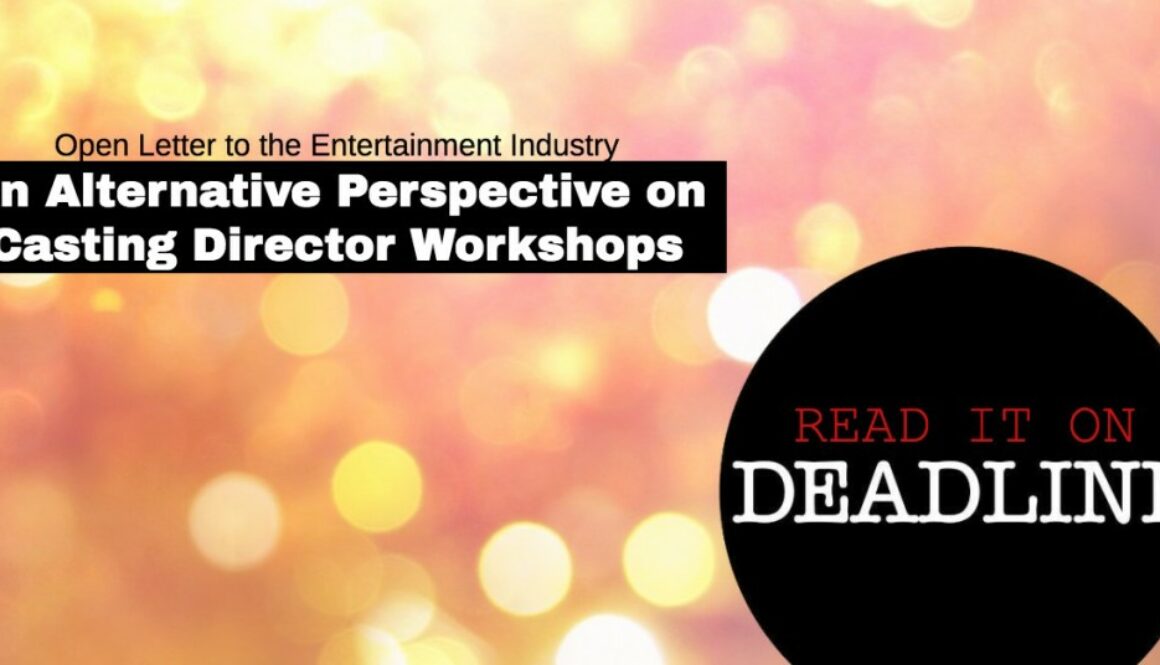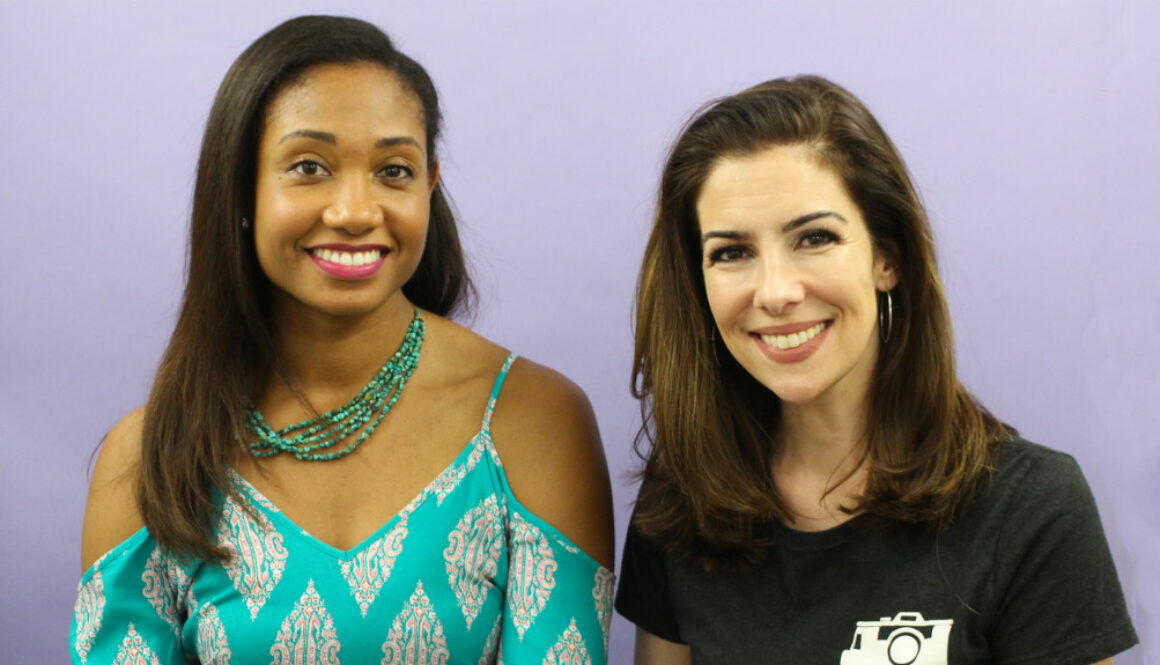I wrote an open letter a couple of weeks ago that was published by Deadline Hollywood on Sunday afternoon. Read it here. It outlines an alternative perspective on the casting workshop controversy.
I was hesitant to pursue publication of this letter because my point of view could be quickly dismissed as the owner of WorkshopGuru.com, a workshop-related business. But as the weeks have passed since Gary Baum’s first sensationalized article in The Hollywood Reporter (THR), it has become clear to me that it is my place to speak up on behalf of actors who value workshops, despite my conflict of interest. Baum’s articles have created a culture of fear that prevents others from voicing their opinions. The fear stems from several realities: 1) if you dare to post a pro-workshop comment on social media or anywhere else, for that matter, you are attacked vehemently by anti-workshop people; 2) casting directors (CDs) are afraid to lose their jobs after Scott David’s departure from Criminal Minds that was seemingly related to the media coverage; 3) THR is calling employers of casting directors and implying that they are exploiting actors in workshops; 4) some studio executives are demanding that CDs stop teaching workshops (they do not have a full understanding of the issue so, of course, execs just want it to go away); 5) workshop studios are afraid of being singled out and targeted by Billy DaMota, the person who leads this anti-workshop movement; 6) actors are understandably hesitant to speak up because then they are accused of buying their credits and being stupid for doing it; and finally, 7) an investigator from the city attorney’s office is now contacting casting directors and asking them to comment on whether workshops are educational. All of this is so sad to observe, because most of the people involved do not have anything to be afraid of. They are not actually breaking any laws, or doing anything wrong, but this offensive by the anti-workshop camp (with THR on their side) is a lot for anyone to handle.
I spoke with several people Baum interviewed (actors, casting directors and workshop studio owners) after his first article on workshops came out, and they tell me he went into his “investigation” with a decidedly negative point of view — that workshops are all “pay-to-play scams,” and actors are being taken advantage of. Baum told several workshop studio owners that the article would feature casting workshops in a positive light, but as the interviews progressed, it became clear Baum would write nothing positive in his article.
Only one of Baum’s interviewees was willing to be quoted for my article. Baum interviewed David H. Lawrence XVII, a successful actor, voice over talent, entrepreneur, and author of BeFreeToChoose.org, via telephone. Lawrence tells me, “Gary Baum was just a jerk to me. He told me that his status as a writer for The Hollywood Reporter somehow gave him more knowledge about the situation than I have. He thinks actors who do workshops are stupid, but I’ve had great success using workshops. I am not stupid, and I’m not being taken advantage of.” Lawrence encouraged Baum to investigate some actual scams that are being perpetrated on actors. When Lawrence did not provide Baum with any support for his negative perspective, Baum hung up on him.
Investigative journalism at its best.
And then I learned firsthand how adept Baum is at spinning the facts for an article when he interviewed me for the story THR published on June 28.
Gary Baum Got His Facts Wrong in the June 28 THR Article
I had a telephone conversation with Marci Liroff from the CSA Workshop Committee and distributed her comments on the guidelines to several LA workshop studio owners in a private meeting on June 10. Baum’s selective reporting on this meeting and the memo he obtained from an attendee made it sound as though the aim of Liroff and the CSA Workshop Committee was to shut down the workshop industry altogether. While I cannot speak for Liroff or anyone else on the committee, I was explicitly told this is not the case. Liroff comments were taken out of context for Baum’s article. The context of the memo that I offered verbally during the June 10 meeting, along with my full memo, make it clear that the goals of the CSA Committee are to encourage compliance with the guidelines by casting directors and workshop studios, and to ensure that all workshops are fully planned educational experiences for the actors who are investing in them.
The June 10 meeting was private and exploratory, and I know exactly who Baum’s source among the workshop studio owners was. It is no coincidence that Billy DaMota teaches classes at the source’s studio.
Baum’s source arrived late to the meeting, so she missed the introduction and statement of the purpose of the meeting, and she seems to have been unclear on who exactly was in attendance. The list of workshop studio owners that Baum indicated were present and not present in his article is inaccurate.
Baum also wrote that his source observed that workshop owners “have no intention of changing how they are running things and what they are doing.” This is incorrect. The point of the meeting was to facilitate communication between the parties involved to ensure that all workshop studios are consistently operating under the CSA guidelines and the Krekorian Act (AB1319). The owners in attendance understood that even if one studio fails to adhere, it could reflect poorly on the entire industry. Baum noted that workshop owners were upset that there has been a “monthly dip in client business,” but omitted the fact that studio owners noted that this time of year (May through July) is historically always slow for the workshop industry, and for most actor-related businesses.
Several workshop studio owners were frustrated that casting director teachers are not following their own (CSA) guidelines, and there was discussion about which guidelines studios can be held responsible for versus casting directors. Many workshop owners have observed that casting directors seem confused about or unaware of the guidelines, so they were excited about the prospect of the CSA town hall meeting where casting directors would get clarification on the guidelines as well. (This CSA meeting happened last night.)
So I wrote the open letter because I was annoyed at the misreporting, and also because someone finally needed to share a different perspective. And thankfully, Deadline, agreed to publish it. But I had a word limit, so I was not able to include all of my thoughts. If you are interested in some of them, please continue.
Workshops as Educational Experiences
Some workshops are great learning experiences, and some are not. Some casting directors are great teachers, and others are not, just like some college professors are great teachers, and others are not. Anyone who tells you that anything is all good or all bad is full of it.
But many casting directors, and even associates (and even some assistants with more responsibility!) are qualified to teach workshops. Some examples of what actors can learn:
- The casting process for a particular kind of project
- The casting process for projects that shoot outside of Los Angeles
- Effective audition technique
- How to make strong, bold choices in an audition
- How to break down material
- How to audition for roles of different sizes
- How to access the content of a scene in a cold reading situation
- Taking direction in an audition
- How to prepare for callbacks
- What to expect during producer sessions and beyond
- How to follow up and maintain a relationship with a casting office
- What makes a headshot effective
- What makes a demo reel effective
I am not the only actor who sees the educational value of casting workshops. Here are a couple of comments made by actors on BeFreeToChoose.org, the website created by Lawrence. The site is “dedicated to the right of actors to choose to attend any workshop they deem effective, paid or not”:
“It seems to me that the natural education we get from listening to the CD relate how she works, what she looks for, what mistakes she sees being made, what makes her gravitate towards an actor (or away), and all of the enormous teachable moments when you and other actors work…for me, those are invaluable.”
“I learn something from each CD workshop I’ve taken and I’m a much better actor and auditioner now than I ever was prior. Why? Because constantly getting up in front of CDs on a regular basis and doing cold reads and then redirects on the fly has made me stronger and more confident. Plus, you learn the likes and dislikes of certain offices. All valuable stuff.”
So the potential educational value of workshops is clear, but there comes a time in an actor’s career trajectory when the value of workshops swings from being mostly educational to more focused on connecting with the casting director and other actors at the workshop. Once an actor already has a good understanding of the casting process, solid audition technique, lots of audition experience, and solid marketing materials, they do not need those basics. At that point, the value in attending workshops lies more heavily in learning the specifics of offices and projects (a more targeted and specific kind of research that a sales professional in any other field would find obviously beneficial), and in networking.
Workshops as Networking Opportunities
In the open letter, I made the point that networking can and does occur in educational settings, so I won’t reiterate it here. I will add that I wholeheartedly agree that “networking” should not be the ONLY activity that happens in a workshop. They must also be educational in some way, which is why I am excited to learn about the outcome of last night’s CSA townhall meeting, where casting directors presumably were instructed on guidelines to follow to ensure that workshops are consistently educational.
Many of the actors in a workshop will not receive an opportunity to audition after a workshop for a variety of reasons: their craft may not be at the professional level yet, the casting director may not come across a role that is appropriate for them, or the CD could forget that the actor exists. So if the instructor doesn’t teach anything during the workshop, many actors will receive nothing of value for the money they pay. If an actor is paying for a workshop, she deserves to learn something helpful.
There Is a Strategic Way to Choose Workshops
I believe actors should choose workshops according to our goals, and focus on attending workshops with specific people we want to meet who have established reputations as good teachers. I founded WorkshopGuru.com to make it easier to do this research, and to share information among the community of actors who do workshops.
Workshop Guru members have access to reviews of casting directors and workshop studios. The reviews feature was born out of the fact that not all workshop experiences are equal. Casting directors have different qualities to offer, and so do workshop studios. For example, some studios have comfortable facilities, and some don’t. Some have a pushy workshop sales process, and others allow you to book classes via a convenient, well-organized website. I wanted actors to have a safe forum to share information, so Workshop Guru reviews are published anonymously, and moderated to ensure they are respectful and constructive.
From an anecdotal survey of the reviews on Workshop Guru, the vast majority are positive. Actors believe that casting directors love actors, and enjoy teaching the workshops, and actors get value from them as well.
Some examples of recent positive reviews on Workshop Guru:
“One of my favorite recent workshops. He’s a former actor, so very laid-back and understanding. Chill attitude, loves working with actors, and gives great constructive feedback.”
“He’s not going to just smile and say great job, he’s really good at giving specific constructive feedback so that you walk out of the room with something to work on, but also feel good about what you did in the room… I read a review that said he was a little intimidating – he can come off that way at first, but he does truly care.”
But of course there are instances when workshop experiences are not so stellar. Here is an example of a recent negative review that highlights the casting director’s failure to give useful feedback on an actor’s performance:
“You get one chance, zero redirects. She will critique what she would want to see, but you don’t get the opportunity to show her you can do it. Has you choose from her sides (which is fine), but not open to interpretation. She knows what she wants to see, and doesn’t take into account that each actor will bring something different to the role.”
Below is another that mentions a casting director’s negative attitude toward actors:
“Didn’t give us the sides until the night before, which is fine except for the fact that he gave us the wrong sides and then yelled at the actors for having the wrong sides… Just overall didn’t like his behavior toward actors and he was very full of himself.”
As one reads reviews on the site, it becomes clear that the answer to this problem is not to eliminate all casting workshops, but rather to make everyone aware of which are not beneficial so actors stop paying to go to them. Our database of reviews is becoming more robust as actors realize they should be more thoughtful about whose workshops they attend.
Alternatives to Paid Casting Director Workshops
If you are an actor who is morally opposed to workshops, I believe you should honor your values. Don’t do them. Here are some ideas for other ways to take advantage of educational and networking opportunities:
- Pursue free showcase opportunities. Some career coaching companies offer them, and the major networks host talent showcases each year. If you are a savvy producer, and willing to put in the work, you can rent space, host your own showcase, and invite industry guests. Most of these options require a much higher investment of time than paid showcases, but that may be preferable to you.
- Attend free casting director workshops hosted by the SAG-AFTRA Foundation. This option is only available to paid-up union members, so it is not actually free, and some fill up very quickly, but you should certainly take advantage of them if you can.
- Sign with an agent or manager who is successful at getting you general meetings. If you have representation, your reps can likely get you general meetings if you are a promising young star-in-the-making, an already-established actor, or just coming off of your first big series or film. You are not likely to get general meetings with no credits. You are also not likely to get a decent agent or manager with no credits or experience. Ask your friends and mentors to connect you, because referrals are your best bet.
- Perform in theater and improv shows. Do great work consistently and invite the people you want to build relationships with to see you perform live. Make others aware of any positive reviews, buzz and accolades that your work generates.
- Produce your own work and get it out there. If you have the skills, it is easier than ever to produce content with a high production value and share it on the Internet, submit to film festivals, and pitch it to distribution outlets.
Whether you participate in workshops or not, all of the above strategies are valuable. Workshops are just one tool – they should never be an actor’s only outlet for networking or education.
The Conclusion
In a perfect world, every workshop is an educational experience. Workshops are also, by their very nature, networking opportunities for actors. But in the real world market for workshops, some are better at providing these services than others. Some are high quality educational and networking experiences, and others are not. It’s up to the casting director and the workshop studio who determines the workshop format to make sure actors learn something, because that educational experience is what actors are paying for. Any relationship that is forged, and any auditions or other opportunities that result from that relationship are a bonus.
Furthermore, actors should be free to make the decision about whether to attend workshops. They can choose based on their budgets, where they are in their careers, and their philosophical positions on the issue. When actors decide to do workshops, they should be informed consumers, and patronize the studios and teachers who uphold the law and offer quality experiences to all of their students, regardless of what happens after the workshop.
So on behalf of actors who need workshops for many reasons, I would like to challenge workshops opponents to propose a viable alternative to paid workshops that encompasses all of their benefits, rather than simply criticizing the system as it exists. It is easy to be critical and make generalized accusations, but much harder to be constructive and find creative solutions to specific problems.
We will see how workshops evolve as a result of this new attention. Some changes, like increased access to free workshops, and more well-planned, educational workshops, will be positive. But actors, casting directors, and workshop studio owners must stand up for their right to interact ethically and legally in a workshop setting. Professionals involved in workshops are being harassed, shamed, and misrepresented, and we cannot allow for it any longer.




